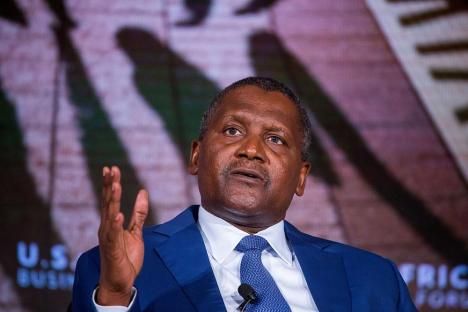Nigerian billionaire industrialist Aliko Dangote has unveiled a bold plan to expand the Dangote Petroleum Refinery and Petrochemicals Company (DPR) from its current capacity of 650,000 barrels per day to an impressive 1.4 million barrels per day (b/d).
The expansion, once completed, would make the Dangote Refinery the largest single-site refinery in the world, overtaking India’s Jamnagar Refinery, which currently holds the record at 1.36 million b/d.
In a recent interview with S&P Global Commodity Insights, Dangote revealed that the refinery’s engineering design included provisions for future expansion. According to him, the complex has sufficient land and infrastructure within the Lekki Free Zone in Lagos State to accommodate a second refining train, additional processing units, and storage facilities.
Dangote explained that the company is actively exploring new financing opportunities and is in discussions with potential investors from the Middle East and other regions to secure the funding required for the project. He emphasized that the move is part of a broader vision to make Nigeria the energy hub of Africa and a global player in refined petroleum products.
Refinery Status and Expansion Details
The Dangote Refinery, commissioned in 2024, currently operates with a capacity of 650,000 barrels per day. It is the largest refinery in Africa and one of the most advanced globally, designed to meet about 80 percent of Nigeria’s domestic fuel demand while producing gasoline, diesel, jet fuel, and petrochemicals for export.
The company has already set an intermediate target of increasing capacity to 700,000 barrels per day by late 2025. The eventual plan is to reach 1.4 million barrels per day through the addition of a new refining train and supporting infrastructure.
To ensure steady operations and feedstock supply, the company is constructing new crude oil storage facilities with a combined capacity of more than 6 million barrels. This will allow the refinery to import crude oil if domestic supplies fall short. Dangote Industries is also investing in logistics systems, including pipelines, jetties, and terminals, to enhance supply chain efficiency.
In addition to refining, the petrochemical segment of the facility is being expanded to increase polypropylene production from one million to 1.5 million metric tonnes annually. Plans are also underway to add new product lines such as linear alkylbenzene, base oils, and polyethylene to support the production of detergents, lubricants, and plastic materials.
Financing, Ownership, and Strategic Partnerships
Dangote Industries Limited (DIL) has secured new financing arrangements estimated at over four billion US dollars to support the refinery’s expansion and petrochemical diversification projects. Dangote confirmed that the company is also considering an initial public offering (IPO), with a plan to list between five and ten percent of the refinery’s shares on the Nigerian Exchange (NGX) within the next 12 months.
The billionaire stated that Dangote Group intends to retain majority control of about 65 to 70 percent, while inviting international investors and sovereign wealth funds to participate. The company is reportedly in talks with major Middle Eastern and Asian investors to form strategic partnerships that will provide both technical and financial support.
Dangote noted that the collaboration will help improve access to crude oil, broaden export markets, and facilitate technology transfer in the refining and petrochemical sectors.
National and Regional Impact
Industry analysts describe the expansion as a transformational milestone for Nigeria’s energy sector. If successful, the project could reduce or completely eliminate Nigeria’s long-standing dependence on imported petroleum products, which has cost the country billions of dollars annually in foreign exchange losses.
The refinery’s output is expected to meet domestic demand while also supplying regional markets across West Africa, Central Africa, and parts of Europe. This would significantly strengthen Nigeria’s balance of trade and foreign exchange reserves.
The project also promises to generate thousands of direct and indirect jobs, boost local content, and stimulate industrial growth in associated sectors such as shipping, engineering, manufacturing, and logistics. Furthermore, it is expected to contribute to stabilizing fuel prices across Africa and increase Nigeria’s global competitiveness in the energy market.
Operational Challenges and Risks
Despite the optimism surrounding the expansion, several challenges remain. One major issue is the reliability of domestic crude oil supply. Although the Federal Government has allocated significant crude volumes to the refinery, Nigeria’s production levels have fluctuated due to pipeline vandalism, oil theft, and maintenance issues.
Operational stability is another key concern. The refinery’s residue fluid catalytic cracking (RFCC) unit and other components require high operational efficiency to maintain output levels and avoid downtime.
Additionally, global refining markets are becoming increasingly competitive, with Asia and the Middle East investing in massive new facilities. Analysts caution that global refining margins may narrow by the end of the decade, potentially affecting profitability. However, Dangote remains confident that Africa’s growing fuel demand and Nigeria’s strategic location will sustain the refinery’s long-term viability.
Economic and Strategic Significance
The expansion of the Dangote Refinery represents a major step toward achieving energy independence for Nigeria. It aligns with the government’s economic diversification agenda and the goal of transforming Nigeria into an industrialized, self-sufficient nation.
Beyond the economic benefits, the project also has strategic significance for Africa. It could turn Nigeria into the continental hub for refined petroleum products, reducing reliance on foreign refineries and strengthening regional energy security.
For Dangote, this project is not only a business venture but also a national legacy. The entrepreneur described the refinery as a “patriotic investment” intended to solve Nigeria’s long-standing fuel challenges and create opportunities for future generations.























































